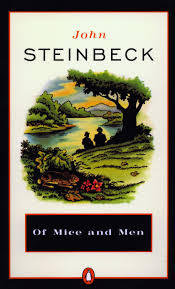When I started wracking my brain for a book to talk about when it came to YA fiction with characters that have disabilities, I realised that there was disappointingly few options to choose from. Which you know, isn’t great considering I’m writing a blog about diversity in YA fiction.
However, one of those very few options that I could remember was “Of Mice and Men” by John Steinbeck which I read in year 10 – and didn’t particularly like.
Upon reflection, it was probably because it was a compulsory text for school and anything that I have to read and then answer questions for is not something I’m going to enjoy (with the exception of “The Kite Runner” by Khaled Hosseini which tugged on my heartstrings like a sad kitten with cotton wool).
But regardless of whether I enjoyed the novella or not, Steinbeck’s character of Lennie Small struck a chord with me that quite possibly warrants a re-read on my behalf (and yours) and further discussion.
For those who haven’t read the book, the general storyline is as follows:
Two migrant labourers named George Milton and Lennie Small are ranch hands at a Californian farm and dream of owning their own one day. George is protective over Lennie who is physically strong and is described as being “simple-minded”. Amidst other happenings (e.g. racism at the ranch against another character and a flirtatious ranch-owner’s wife who doesn’t have a name for some reason), Lennie eventually runs into trouble due to his fixation over petting soft things and George struggles to help his friend from the wrath of others.
Steinbeck’s representation of Lennie Small is as relevant as it was during the late 1930’s as it is today. Although in today’s society, mentally disabled individuals are far more accepted and supported in comparison to Depression era mobs (with their sometimes literal pitch forks), Lennie’s feelings of helplessness may still be reflective of those with special needs.
Lennie in the book is a gentle giant. Society is not understanding of his disabilities. He’s innocent and child-like in so many ways but his brute strength and lack of control leads to some unfortunate happenings and nobody except George really understands or tries to help him.
For those with mental disabilities, feelings of helplessness are a very real thing. They may have good intentions but their lowered degree of cognitive reasoning and understanding of the world could lead to sticky situations where they may do or say things that they didn’t intend to be harmful but ultimately is. Lennie in the book is not only a character I sympathise with, but one that I would like to read more about. As I have come to realize that I know startlingly little about mentally handicapped individuals, I feel like fiction is a great way to even begin to bridge that gap of understanding (or lack thereof in my instance).
So while I probably wouldn’t recommend this book for those who do have a mental disability (Spoiler alert: it is not a happy ending for Lennie), I would recommend it for others who want to be emotionally compromised by how unfair everything is in the story.
As always, I am no expert on the topic so please correct me if I’m heinously wrong about something. Thanks for reading, please comment below or on any of my other social media accounts and don’t forget to subscribe to my blog!
Till next time,
Not Another Mary Sue
QUESTION OF THE WEEK: What YA books featuring characters of mental disabilities do you recommend?
